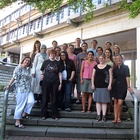The ideals behind one of the most famous phrases in the United States’ Declaration of Independence, “the right to life, liberty, and the pursuit of happiness”, can be found within several short stories of Toshio Mori’s Yokohama, California (Washington UP, 1949).
The author weaves different topics through his short stories, such as feelings of sadness, loneliness, restlessness, and the search for an identity and sense of belonging that stem from the immigration process. Other topics include racism, financial stresses that cause bad living conditions, including living below the poverty line. The list could go further. However, throughout all the hardships, the end result includes many positive experiences and experiences, as the characters acclimate within the American environment to fulfil their own goals and their idea of the American dream.
‘Business at Eleven’ tells the story of an 11-year-old Japanese American named John. When he grows up, John wants to own a book shop where “he would handle old books and old magazines as well as the new ones and own the biggest bookstore around the Bay Region”. (Mori, 152). For that reason, he started his business as a ‘salesman’. His father once taught him that if he wanted to be a salesman, he had to be a good one. Therefore, John takes his job seriously: he knows every preference of his customers by heart; and he knows a large number of authors of modernism and social criticism, so that he is aware of the various preferences of every single customer. He shares his thoughts and dreams with one of the customers, the narrator of his story. The reader learns his family background, especially at the end of the story, when he informs him that his father married a woman he did not know and now they are moving to Los Angeles.
With open endings within every single story, Toshio Mori succeeds in keeping the reader in suspense. Readers can make vague presumptions, but ultimately, the reader cannot be sure how the story really ends, which is what keeps the reader in suspense, up until the end.
There is another business story in the book, but this one steers into another interesting direction. “Say it with Flowers” is a business story in which the main character, Teruo, is not interested in profit, in contrast to the young 11-year old, John. Here, the reader is introduced to a character who is interested in morality and having a clear conscience; he is someone who is considerate of other people and prefers to work for their benefit rather than for the benefit of business. The author chose a flower shop as location, so that Teruo works amidst the inviolable and divine world of nature. Flowers especially symbolize mortality or time fading away, also emotions and feelings are also expressed, even words, as the title of the story tells. In general, flowers or nature are known as traditional symbols of Buddhism, a topic which is often chosen by Toshio Mori, who also integrates them in several other stories.
Teruo’s idealism could be his own individual way to succeed in life. The story is about his personal meaning of liberty and his personal way to the pursuit of happiness, in an individual way, although they all might have the one ‘dream’ in common, it varies into different directions. Furthermore, even though the characters may all have one ‘dream’ in common, the book shows the reader that the pursuit of happiness is complex, and is always connected with success and failure, with hope and misery.
The book shows great potential as the variety of topics within several discussions lead to different directions. Every individual has her or his own idea of the pursuit of happiness, but the idea of creating a place where nobody is treated as a stranger, a foreigner, or as someone who does not belong, seems to be the most pressing one. The reader, especially those who have experience with immigration, can sympathize and identify with most of the characters in the book. In addition to the advantages of the immigration process, the book also offers an extensive of its dark side. This book, as described in the introduction from the 1985 edition, is the “the first real Japanese-American book. […] – a monument, a classic of literature. This is more than a book. This is legacy, tradition. This is the enduring strength, the embodiment of a people. This is the spirit, the soul. This is the community, the identity. This is the pride, the joy, the love. This is Yokohama, California. This is Japanese America.” (Mori, v.).
© 2010 Latifa Maazouz



